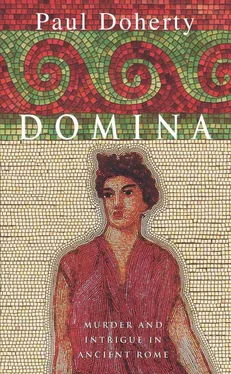Paul Doherty - Domina
Здесь есть возможность читать онлайн «Paul Doherty - Domina» весь текст электронной книги совершенно бесплатно (целиком полную версию без сокращений). В некоторых случаях можно слушать аудио, скачать через торрент в формате fb2 и присутствует краткое содержание. Год выпуска: 2012, ISBN: 2012, Издательство: Headline, Жанр: Исторический детектив, на английском языке. Описание произведения, (предисловие) а так же отзывы посетителей доступны на портале библиотеки ЛибКат.
- Название:Domina
- Автор:
- Издательство:Headline
- Жанр:
- Год:2012
- ISBN:9780755350490
- Рейтинг книги:3 / 5. Голосов: 1
-
Избранное:Добавить в избранное
- Отзывы:
-
Ваша оценка:
- 60
- 1
- 2
- 3
- 4
- 5
Domina: краткое содержание, описание и аннотация
Предлагаем к чтению аннотацию, описание, краткое содержание или предисловие (зависит от того, что написал сам автор книги «Domina»). Если вы не нашли необходимую информацию о книге — напишите в комментариях, мы постараемся отыскать её.
Domina — читать онлайн бесплатно полную книгу (весь текст) целиком
Ниже представлен текст книги, разбитый по страницам. Система сохранения места последней прочитанной страницы, позволяет с удобством читать онлайн бесплатно книгу «Domina», без необходимости каждый раз заново искать на чём Вы остановились. Поставьте закладку, и сможете в любой момент перейти на страницу, на которой закончили чтение.
Интервал:
Закладка:
Passienus became a shadow of his former self, more subdued and withdrawn, as if concentrating on a problem to which the solution constantly evaded him. More and more Agrippina took over their affairs. I noticed that Passienus had little love for Nero and the boy responded in kind.
Nero was developing into a sturdy, copper-headed dumpling, with thick lips, a podgy nose and striking blue eyes, which he would constantly screw up as if short-sighted. A clever boy who learnt his lessons quickly, Nero was also a consummate actor. He loved singing or dancing, and composing his own poetry and every visitor to his mother’s household was always entertained by Nero’s childish songs, poems or performance in some play. He was a creditable athlete, graceful at running and swimming, and with no fear of horses. Acting, however, was his great passion — that and his mother. Perhaps their separation in his early years had created an insatiable hunger for her presence. He clung to her and she responded, allowing him to share her bed as protection against his constant nightmares. Even when Passienus joined her, Nero slept on a couch in the same room. One morning I heard Passienus arguing with Agrippina about it — he never protested again.
As Nero grew older, I became more interested in the little monster. I would often find him crouching by Agrippina’s door, listening or peering through the keyhole. The servants and slaves gave him the run of the villa, treating him with fawning adoration. Of course there were also whispers and gossip about their relationship. One maid made the mistake of telling others that she had seen Nero wearing his mother’s clothes. Within a day she disappeared and was never seen again.
Passienus avoided the boy as much as he could. I once heard him refer to Nero as ‘that little horror’ but generally he had the sense to keep such sentiments to himself. I didn’t like Nero’s cloying sweetness, the mock adoration in those chilling blue eyes as he questioned me, particularly about his mother and the activities of Uncle Caligula. I tried to answer as tactfully as possible. Nero had a sharp mind and keen wit, and would pester me until he was satisfied.
Agrippina still used me to send messages into the city.
‘You are nondescript, Parmenon,’ she declared. ‘You can enter rooms and stand silently without being noticed. You are a born spy.’
I baulked at the insult but she threw her arms round my neck and kissed me on the lips. ‘Not my spy,’ she murmured. ‘More my shadow.’
I never knew exactly what I took into Rome, letters hidden away in a flask of wine, coded messages which only the recipient could understand. I would collect the gossip and the scandal, scooping it up like a fisherman would a catch in his net, and bring it all back to Agrippina. I told her how the Lamian Gardens were still haunted by Caligula’s ghost, whilst the same eerie phenomenon had been experienced in the place where he’d been assassinated. Nero overhead this, absorbing every detail avidly. Of course, he questioned me closely later and made me repeat all the ghastly stories.
On one beautiful afternoon at Tusculum, a slave reported that one of the hanging cages in the garden had been forced and the songbird was missing. Usually, a chamberlain or steward would have dealt with such a matter but they were all enjoying a wine-soaked siesta. I decided to take care of the problem myself. I inspected the cage, became intrigued and went deeper into the garden, where I heard a childish voice chanting in the bushes. I quietly moved these apart, to see Nero kneeling inside. His body shielded a small rock, a makeshift altar on which the songbird had been sacrificed. The bird had been slit from throat to crotch, its innards spilt out in a bloody mess. Nero had dipped his fingers into the blood and daubed his face as if he was a priest.
‘What are you doing?’ I demanded.
‘I am performing a sacrifice.’
‘For what?’
‘For nothing, silly!’ Nero retorted. ‘I’m sacrificing to Uncle Caligula. When he comes to me, I talk to him.’
Despite the sunlight and the warmth, my skin crawled and my hands turned clammy. It wasn’t just the sacrifice, the destruction of a beautiful bird, but those clear blue eyes looking at me so earnestly and Nero’s aimless chatter, so reminiscent of Caligula.
‘Uncle is a God,’ Nero pressed the point. ‘And I am his nephew. It is right to make pious sacrifice.’
He was only eight years old but he talked and looked like a seasoned conspirator. I started to withdraw but he sprang to his feet. He grasped my wrist, digging his nails deeply into my skin.
‘It’s our secret, isn’t it, Parmenon? Just between you and me. You won’t tell Mother?’
‘I won’t tell Mother,’ I promised.
‘That’s good,’ the little horror replied. ‘It’s not the first time I’ve done this you know, Parmenon. Uncle tells me everything. He sends his regards.’ His face creased into a smile. ‘Now you may go and I’ll finish the rite.’
I never did tell Agrippina: I was too frightened to do so. In her eyes, Nero could do no wrong. In those heady, conspiratorial days, as Agrippina spun her web, no one was safe. Much as she loved me, much as she needed me, I, too, could become an offering on the altar to her adorable son.
Six years in all passed, slipping away like a dream. Sometimes I tried to live my own life: I’d meet a pretty face, I’d invest a little money. I was planning to buy my own farm but remorselessly Agrippina drew me back. I had no choice; I danced like a moth round the alluring flame. Agrippina used me more and more as her messenger to Rome.
‘Concentrate on Claudius,’ she warned, ‘and that glorious bitch of his.’
I did so. There were plenty of people ready to tell their tales. Claudius had won some respect, being more restrained and less bloodthirsty than his predecessor. However, his growing eccentricity was a constant theme at dinner conversations. Claudius liked the old ways and he fancied himself as a great judge or lawyer. He would often sit in the courts to hear and arbitrate on cases. Sometimes he proved himself a tyrant, at other times he’d allow the lawyers to insult him. One little Greek, frustrated by Claudius’s refusal to give him a fair hearing, hurled a wax tablet across the court, striking Claudius on the face.
‘As for you!’ the Greek screamed. ‘You are not Caesar, you’re just a silly, old man!’
Claudius dabbed at the cut, and allowed the Greek to have his say and leave without being punished. At other times Claudius would become involved in the day-to-day lives of his subjects. He began a campaign against ostentation, which he initiated by buying a beautiful silver chariot and having it smashed to pieces in front of a crowd of onlookers. Or he would issue edicts such as: ‘Yew juice is a sovereign remedy against snake bite’, or, ‘breaking wind at table is not a breach of etiquette’. I think the latter was to excuse his own lack of personal hygiene.
Claudius loved to stage games and pronounced that any gladiator who pretended not to fight well would have his throat cut. Sometimes he would bandy words with the mob or even with the gladiators themselves. On one occasion, during the draining of the Fucine Lake, Claudius decided to stage a mock naval battle. It was the usual nonsense: two triremes, each manned by a team of gladiators, would crash together and the crowd would be treated to a sea battle. Just before the games began the gladiators, as was customary, paraded in front of the imperial box and gave the ritual salute.
‘Hail, Caesar! We, who are about to die, salute you!’
‘Or not die, as the case may be!’ Claudius retorted.
The gladiators thought he was pardoning them, granting them life, so they put down their weapons and refused to fight. The crowd was treated to the spectacle of their Emperor having to climb into the arena and bribe both sides to continue.
Читать дальшеИнтервал:
Закладка:
Похожие книги на «Domina»
Представляем Вашему вниманию похожие книги на «Domina» списком для выбора. Мы отобрали схожую по названию и смыслу литературу в надежде предоставить читателям больше вариантов отыскать новые, интересные, ещё непрочитанные произведения.
Обсуждение, отзывы о книге «Domina» и просто собственные мнения читателей. Оставьте ваши комментарии, напишите, что Вы думаете о произведении, его смысле или главных героях. Укажите что конкретно понравилось, а что нет, и почему Вы так считаете.












